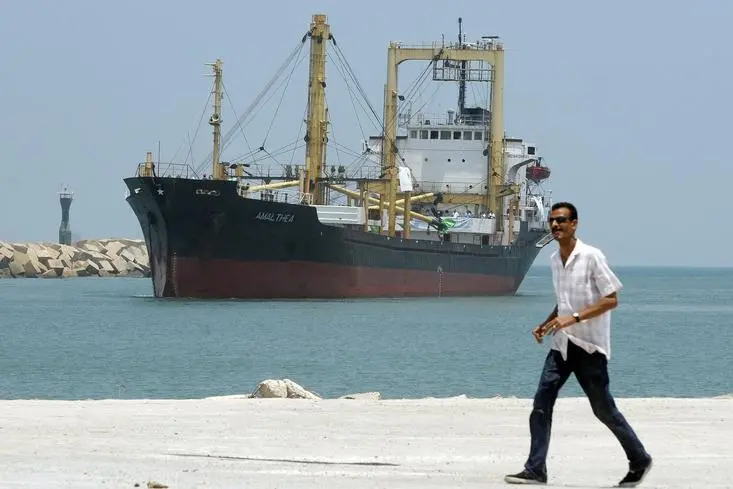PHOTO
Imports declined during the first two months of the year. Sherine Abdel-Razek looks at ways to go even further
Egypt's imports shrank by 27 per cent to reach $7.568 billion in January and February 2016 compared to the same period last year, according to figures released by the Ministry of Trade and Industry.
The decline comprised a wide array of imported commodities starting with agricultural imports, which retreated by nine per cent, ready-made garments by 32 per cent, pharmaceuticals by 28 per cent and food industries by 24 per cent.
Limiting imports is a top priority of the Egyptian economy which is suffering a severe dollar crunch. The overall value of imports came at LE60 billion in fiscal year 2014-2015, pushing the trade deficit to $39 billion.
Tarek Amer, the Central Bank governor, said Egypt can save up to $20 billion annually by rationalising unnecessary imports.
In December, authorities tightened rules to finance the imports of goods deemed non-essential and have asked importers to register their foreign suppliers with the government.
Prime Holding, a leading local investment bank, issued a report providing a breakdown and analysis of different imports to find out which items can be substituted by local alternatives and maximise the value added to the local economy. The report is entitled "How to replace our imports".
Prime recommends increasing crude oil imports, limiting fuel oil like diesel and gasoline and investing the money saved in setting up refineries. Such a shift in policy would offer job opportunities and encourage foreign investments in fuel-producing industries.
It states that the cost of building a refinery is $1 billion and that a refinery with a capacity of 466 barrels per day can cover one per cent of the consumption gap.
"Abandoning $1 billion in the short term can save Egypt $1 billion annually, a sum that can be invested in building a modern refinery with a capacity that is able to cover the $8 billion worth of fuel imports annually," Prime said.
Another set of imported commodities that needs to be reconsidered are grains. Egypt imports $4.7 billion worth of it each year. This includes $3.7 billion on wheat imports and $1 billion for corn used as feed stock. Egypt currently covers only 66 and 55 per cent of the consumption of the two commodities respectively.
The problem with these two crops lies in the reduction in the areas cultivated with them and the difficulties of storing the harvest. Also, farmers have abandoned them for more lucrative crops.
Land cultivated with wheat is getting less each year due to plans to build on agricultural lands. Up to 20 per cent of the harvest, equivalent to 40 per cent of imported volume, is wasted due to improper storage.
Which is why, according to Prime, there should be laws preventing building on arable lands and the country should give more attention to the Qattara Depression project which would secure 250,000 new feddans of land suitable for cultivation. Metallic grain silos, where the rate of wasted grain is at its minimum, should also be used on a larger scale.
The Ministry of Agriculture should encourage farmers to cultivate cereals by compensating them with the difference in profit in various crops in addition to deciding on the procurement price even before the crops are cultivated.
Once a net exporter of cotton, Egypt's cotton imports last year amounted to 350, 000 tons while the local production came at 250,000 tons, 14 per cent less than the previous year (Egypt used to produce 2.2 million tons). Egyptian cotton production has been on the slide due to its high price compared to that of other producers.
A year ago the Egyptian government decided to no longer subsidise farmers planting cotton, citing the high cost of growing it, particularly the long-staple variety, and especially because the demand both locally and internationally is retreating.
Market prices of cotton are currently low. Without a subsidy, farmers are not able to sustain the cost of planting cotton. According to Prime's report, cotton farmers burnt their crop in 2015 in order to escape the high cost of its harvest.
Meanwhile, banning cheaper cotton imports would end the local strategic textiles industry. Prime underscores the importance of increasing cotton subsidies to cover the gap in prices between the local produce and that of other countries so that Egypt can export more of it.
Expanding in fish farming is a means to provide Egypt with a much-needed source of protein. Egypt imports $660 million of fish every year, though it can easily be an exporter by investing more in fish farms. Egypt has been investing in recent years in fish farms in the desert. These farms use wasted irrigation water.
Warm freshwater pumped up from underground aquifers to water plants could first be used to raise certain species of fish before becoming irrigation water for nearby crops. This lowers the cost of fertilisers and irrigation as it uses the same water both for cultivating plants and raising fish.
© Al Ahram Weekly 2016





















